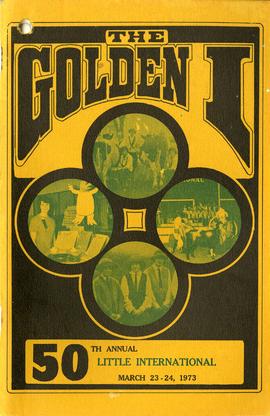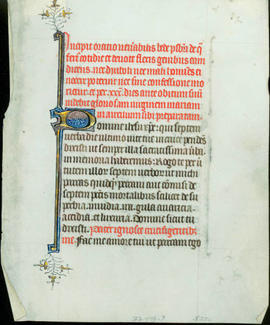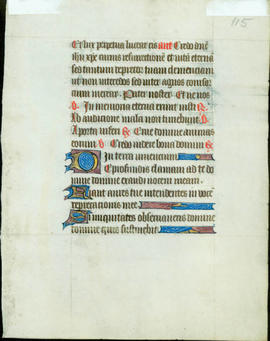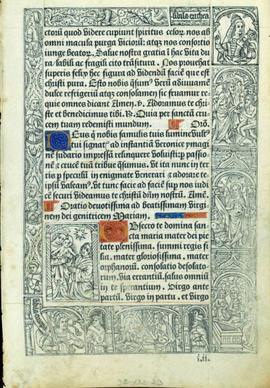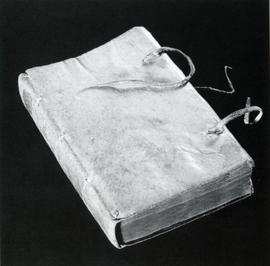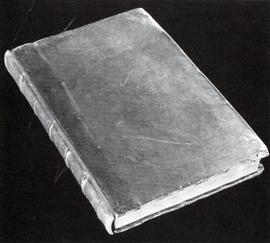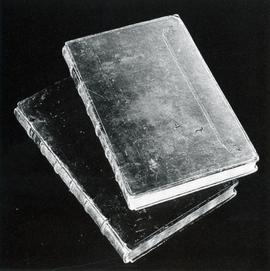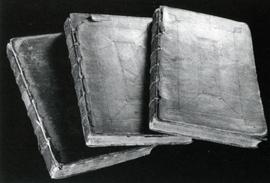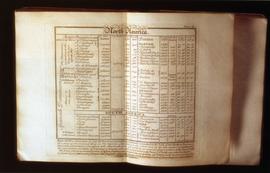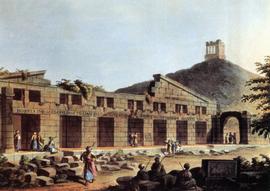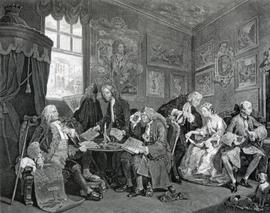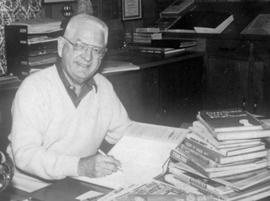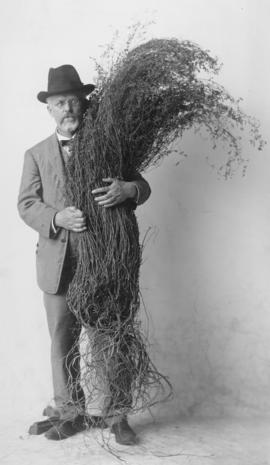The H.M. Briggs Library holds four illuminated manuscript leaves, or single pages. The pages consist of religious texts. One leaf is the Biblia Sacra Latina, which is a page from the Latin Bible and dates to the 13th century. The leaves were purchased from the estate of Morris Elmer Nellermoe, Jr. (1926-2004).
The Hours of the Virgin, a section of the Book of Hours, which are devotional prayers for different times of the day. Hours of the Virgin, also known as the Little Office of the Blessed Virgin Mary, contained psalms, lessons, hymns, and prayers said at each of the eight canonical hours: Matins, Lauds, Prime, Terce, Sext, None, Vespers, and Compline. The Book of Hours was the bestselling book of the Middle Ages. These pages date from the middle of the 15th century.
The Biblia Sacra Latina chapter numerals in red and blue with much pen work ornamentation. The work contained a number of historiated and illuminated initials, remarkable for the extremely wide margins.
Nellermoe, Morris Elmer, Jr.Leaf from the Hours of the Virgin. The handwritten page dates to 1440-1450, is Flemish, and made of velum. The recto contains 13 lines of unornamented text. The verso also has 13 lines with one rubricated phrase. The letter O is historiated in red, blue, and gold and connected to marginal flourishes in gold and blue. The Hours of the Virgin, part of the Book of Hours that include devotional prayers for different times of the day. Hours of the Virgin, also known as the Little Office of the Blessed Virgin Mary, contained psalms, lessons, hymns, and prayers said at each of the eight canonical hours: Matins, Lauds, Prime, Terce, Sext, None, Vespers, and Compline. The Book of Hours was the bestselling book of the Middle Ages.
Leaf from the Hours of the Virgin. The page is made of velum and was created in France around 1450. The recto contains 18 lines with the first 7 lines have been rubricated. The letter D in the middle of the page has been historiated red, blue, and gold and connected to marginal flourishes. The verso also has 18 lines with several phrases rubricated. The Hours of the Virgin, part of the Book of Hours that include devotional prayers for different times of the day. Hours of the Virgin, also known as the Little Office of the Blessed Virgin Mary, contained psalms, lessons, hymns, and prayers said at each of the eight canonical hours: Matins, Lauds, Prime, Terce, Sext, None, Vespers, and Compline. The Book of Hours was the bestselling book of the Middle Ages.
Leaf from the Hours of the Virgin. The page is made of velum originated in Northern France between 1450 and 1460. The recto contains 16 lines with rubricated and historiated initials and rectangular ornamentation in red, blue, and gold. The verso has 16 lines with rubricated and historiated initials, flowers, and rectangular ornamentation in red, blue, and gold. The Hours of the Virgin, part of the Book of Hours that which are devotional prayers for different times of the day. Hours of the Virgin, also known as the Little Office of the Blessed Virgin Mary, contained psalms, lessons, hymns, and prayers said at each of the eight canonical hours: Matins, Lauds, Prime, Terce, Sext, None, Vespers, and Compline. The Book of Hours was the bestselling book of the Middle Ages.
Leaf from the Book of Hours (Use of Rome) that was printed by Philippe Pigouchet for Simon Vostre in Paris, France, 1496. The leaf is of velum and decorated with metal cuts along the edges. This is an incunabula leaf as it is printed rather than handwritten. The recto contains 27 printed lines with hand painted rubricated and historiated initials and rectangular ornamentation in red, blue, and gold. The metal cuts depict scenes regarding the crucifixion and Jesus visiting Mary afterward. The verso has 27 lines and does not include hand painted ornamentations. The metal cuts depict scenes of Jesus and his apostles. The Book of Hours include psalms, lessons, hymns, and devotional prayers said at each of the eight canonical hours: Matins, Lauds, Prime, Terce, Sext, None, Vespers, and Compline. The Book of Hours was the bestselling book of the Middle Ages.
Compendio delle historie del regno di Napoli Compost da messer Pandolgo Collenucio iurisconsulto in Pesaro
Venitia: ]Michele Tramezino], 1543
Italian humanist Pandolfo Collenuccio was a true Renaissance man. He was a literary, scholar, historian, geographer, collector or rare plants and animals, and diplomat. His works include this history of Naples and poems and dialogues in Latin and Italian.
Itinerarium Banjaminis
Lvgd. Batavorum [Leiden]: officinal Elziviriana, [1633]
The book is 2 inches in width and 3 ¾ inches in height. It contains 233 pages, plus a 7-page index and is soft-bound in white leather.
The Old and New Testament connect in the history of the Jews and neighbouring nations, from the declension of the kingdoms of Israel and Judah to the time of Christ
London: Printed for R. Knaplock and J. Tonson, 1718
Humphrey Prideaux served as a lecturer in Hebrew at Christ Church, Oxford. Prideaux wrote a number of theological works.
Prideaux, Humphrey, 1648-1724A description of the East, and some other countries
London: Printed for the author, by W. Bowyer, 1743-1745
Richard Pococke, an inveterate traveler, made extensive trips to the Middle East, Egypt, and Europe in the 1730s, 40s, and 50s, visiting many relatively unknown regions. He published detailed narrative accounts of his journeys which were highly regarded by contemporaries.
v. 1. Observations on Egypt -- v. 2, pt. 1. Observation on Palaestine or the Holy Land, Syria, Mesopotamia, Cyprus, and Candia -- v. 2, pt. 2. Observations on the islands of the Archipelago, Asia Minor, Thrace, Greece, and some other parts of Europe.
Pococke, Richard, 1704-1765A new survey of the globe; or, An accurate mensuration of all the empires, kingdoms, countries, states, principal provinces, counties, & islands in the world . . . A collection of all the noted sea-ports in the world . . . also the settlements & factories, belonging to the English, Dutch . . . etc. in the East and West-Indies, Africa and other parts
London: Printed for J. Bowles, engraved by T. Cole, [ca. 1765]
Thomas Templeman was a writing master at St. Edmund’s Bury in Suffolk, England
Views in the Ottoman empire, chiefly in Caramania, a part of Asia Minor hitherto unexplored : with some curious selections from the islands of Rhodes and Cyprus, and the celebrated cities of Corinth, Carthage, and Tripoli: from the original drawings in the possession of Sir R. Ainslie, taken during his embassy to Constantinople
London: R. Bowyer, 1803
Luigi Mayer was a watercolorist and draftsman of Italian origin. Mayer’s sketches have been cited as the most accurate representations of the Middle East prior to the nineteenth century.
Mayer, LuigiThe works of William Hogarth: from the original plates, restored by James Heath; with the addition of many subjects not before collected; to which are prefixed, A biographical essay on the genius and productions of Hogarth, and explanations of the subjects of the plates by John Nichols
London: Printed for Baldwin and Cradock by G. Woodfall, [1880?]
William Hogarth was a major figure among eighteenth-century engravers and painters. He excelled at portrait painting and displaying a satiric style.
Hogarth, William, 1697-1764The papers of Robert F. Karolevitz (1922-) span the years 1833-2005, with the bulk of the material dating from 1910-1999. The collection is composed personal, professional, and research files, as well as photographs.
The personal files span the years 1894-2005, with the bulk of the material dating from 1968-1981. The bulk of this series is composed of material relating to personal areas of Karolevitz's life not directly related with his professional writing career. The exception to this would be the correspondence series which is composed of material related to both his professional and personal life and includes correspondence with family members and friends. Materials include audio visual material, awards and recognition, clubs and organizations, committees and boards, correspondence, education, ephemera and collected materials, family, financial and legal documents, and material related to Karolevitz’s other interests and activities.
The professional files span the years 1947-2002, with the bulk of the material dating from 1960-1969. The series consists of material created by Karolevitz during his career. Included are articles that were published in various periodicals, manuscripts and other material related to books written by Karolevitz, columns written for several different newspapers, commercial writing and advertising material, political ghostwriting material and speech files. Also included is material related to publishers, other writings, and other material related to writings, such as layout material, rejection slips, and catalogs that listed his books for sale.
The research files span the years 1833-2005, with the bulk of the material dating from 1910-1999. The series is composed of material collected by Karolevitz relating either directly to research for books and articles that he wrote or material that was of interest to him. Material consists mainly of clippings of newspapers and magazine articles, publications, booklets, brochures, pamphlets, photographs and illustrations, correspondence, notes written by Karolevitz and other miscellaneous collected material. Many folders contain only one or a few items.
The photographs are composed of images Karolevitz collected and used in his many publications. Included are images related to automobiles, journalism, medicine, religion, people, and places.
Karolevitz, Robert F.This collection is composed of material relating mainly Dan W. Johnson and to the city of Marshall in Lyon County, Minn. Included are files relating his military and professional career, his family, collected research and files dealing with Jeanne Johnson & Antiques Ltd., Marshall, Minn., Lyon County, Minn., Southwest State University, and Schwan's Home Service, Inc.
Johnson, Dan W. 1917-2001Frank Leslie's Illustrated Newspaper, Harper's Weekly
The Virginia Driving Hawk Sneve Papers document the literary career, research, and advo-cacy of the acclaimed Lakota writer, educator, and historian. Spanning from the 1960s to the 2020s, the collection includes manuscripts, correspondence, research materials, and pub-lished works that reflect her dedication to Native American storytelling and cultural preservation. It offers a comprehensive look at her contributions to literature, education, and Indige-nous representation.
The Creative Writing series contains fiction and non-fiction works, including Completing the Circle, The Medicine Bag, Dancing Teepees, Standing Bear of the Ponca, and Sioux Women. Each work is accompanied by manuscripts, clippings, correspondence, research notes, print-er’s galleys, proofs, reviews, and scripts. Many manuscripts include editorial annotations and suggested revisions. The correspondence primarily consists of letters between Sneve and publishers, as well as heartfelt messages from schoolchildren, some with drawings, thanking her for her books and school visits. Research materials include notes, collected documents, and recorded interviews. A video adaptation of High Elk’s Treasure is also part of the collection.
The General series includes awards, speaking engagements, clippings, interviews, journals, and research materials. Correspondence features exchanges with publishing houses, Sena-tor Larry Pressler, and fellow writers such as Bob Karolevitz and Audrae Visser. Notably, the series contains an audio reel of an interview Sneve conducted with Harold Shunk, a Bureau of Indian Affairs superintendent. Other items include a 1901 class photograph and various teaching aids.
The Other Writings series highlights Sneve’s contributions beyond creative literature, includ-ing published articles, scripts for a South Dakota Public Radio series, Christian education re-sources for the Episcopal Church Center, newspaper editorials, studies for the Flandreau In-dian School, and a contribution to On the Wings of Peace, a compilation benefiting world peace organizations.
This collection serves as a significant resource for researchers, scholars, and educators stud-ying Indigenous literature, storytelling, and cultural history. It offers a valuable perspective on Native identity, advocacy, and representation, highlighting Sneve’s enduring impact on Native American literary and educational landscapes.
Sneve, Virginia Driving Hawk, 1933-This collection is composed of collected materials presumably used for research, correspondence and writing and miscellaneous materials.
The collected material is composed of numerous pamphlets, newspapers and clippings, an 1862 book of poems by Elizabeth Barrett Browning, material of the Socialist Party in the United States, and a file of research on Steven Truscott, a man who was convicted of murder in Ontario, Canada but may have been wrongly accused.
The general papers include correspondence, some notes and an exam from some of Sewrey's history courses, miscellaneous items and photographs. The miscellaneous items include a map showing lakes, railways, wagon roads, hotels and other points of interest of the Lake District in the vicinity of Alexandria, Minnesota.
The manuscripts cover several topics but the main scope of this material is of anti-Catholicism and frontier Minnesota. Included in the manuscripts is a draft of Sewrey's master's thesis titled The Protestant Minister in Frontier Minnesota.
The published works also covers several topics but the main scope of this material is anti-Catholicism and Communism. Included in this material are two transcripts of a radio program titled Professor's Forum that was broadcast from the South Dakota State College radio station.
Sewrey, Charles LouisTranscription of the Susan A. Jones diaries was performed by Virginia Vander Wal, great-granddaughter of Susan, in March 2006. The diaries appear to have been written while Susan resided in Massachusetts and Wisconsin. The entries provide insight into her daily activities from 1863-1870. Topics include various social activities, mention of the weather, work activities, and important events, such as funerals, first communion, engagement to be married, etc.
The 1863 transcription was from a very small diary that was written before Susan married Henry. There are several entries concerning the Civil War in this diary.
Some of the original diaries were written on loose pages and were very old and fragile. Others were written in 3 x 4 inch diary books with three days to one side of each page. The writing on these pages was very small and faded, especially those entries written in pencil, making is difficult to read.
Blanks in the text indicate words that could not be read due to illegible handwriting or damaged areas on the paper. Words typed in brackets, { }, are words which a guess was made at some of the letters. The spelling of words in the original diary was maintained.
Virginia Vander Wal includes an account of the transcribing of the diaries as well as some genealogical background of Susan A. Jones. Virginia's personal notations are indicated in bold-faced font in the transcription. Also included is a photocopied photograph of Susan A. Jones and discharge papers for Henry R. Jones.
The diaries are not complete in that some years may not have entries for each day or month.
Jones, Susan A. 1844-1925The John E. Miller papers are composed of materials collected by Dr. Miller during his career. Included is course material, interviews, talks, writings, Laura Ingalls Wilder, and friends and colleagues. The bulk of the material is Laura Ingalls Wilder and research for his many other writings.
GENERAL MATERIAL
The general material consists of files related to Dr. Miller’s personal life outside of teaching and writing. He was involved with many organizations, such as the South Dakota Humanities Council, the South Dakota State Historical Society, Phi Kappa Phi, and history conferences, such as the Midwestern History Association and the Dakota History Conference. Included are correspondence, photographs, awards, articles about Miller, SDSU material, and family files.
COURSE MATERIALS.
Dr. Miller taught many courses during his tenure as a faculty member of the History Department at South Dakota State University. Courses include U.S. History, South Dakota history, American economic history, and methods and philosophy of history. After his retirement he taught Osher Lifetime Learning Institute [OLLI] courses on many topics such as the great depression, U.S. president and legislators, and democracy. Included are course notes, exams, and other material related to teaching history.
FRIENDS AND COLLEAGUES
This material is composed of material gathered on friends and colleagues. Included is correspondence, articles, clippings, and photographs.
INTERVIEWS.
Dr. Miller conducted many oral history interviews during the course of his career. The recordings include many important historical figures, such as George McGovern and John Wooden, as well as prominent members of the South Dakota State University community, and SDSU faculty, staff, and administrators. His early interviews were recorded on audiocassettes, and eventually upgraded to digital recorders. There are some transcripts and permission forms for these recordings, but not all.
See the audiovisual and electronic media series for the recordings.
TALKS, PRESENTATIONS, ETC.
This series consists of many talks, presentations, and workshops given by Dr. Miller throughout his career. He also served on panels at conferences, including the Dakota History Conference and Laurapalooza. Included are notes used articles, journals, books, and research material.
LAURA INGALLS WILDER
Dr. Miller is one of America's leading authorities on Laura Ingalls Wilder and Rose Wilder Lane, having written many books and articles on the Wilder’s. Material consists of 16 boxes of research on books written by Laura Ingalls Wilder and her daughter, Rose Wilder Lane, the Ingalls-Wilder family, places where Wilder lived, notebooks of handwritten notes, critiques of other authors works on Wilder, articles and clippings on related to Wilder, research gathered from manuscript collections related to Wilder, other authors works, and Dr. Miller’s writings.
WRITINGS
Dr. Miller wrote many articles, books, and reviews during his career. He also wrote book chapters, collaborated with other authors, and encyclopedia entries. He was a very prolific writer and it is difficult to know whether everything he ever wrote is included in the collection. Included are manuscripts, books, articles, book proposals, notes, and correspondence with other authors and publishers.
RESEARCH
The research material is composed of material collected by Dr. Miller for various projects. Researchers will find material on topics such as politics, elections, democracy, U.S. and South Dakota history, sports, small towns, and creativity; and historical figures such as Johnny Carson, Lawrence Welk, Sam Walton, John Wooden, Walt Disney, George McGovern, Karl Mundt, Alvin Hanson and many others too numerous to list. This material was used in his writings and in teaching his courses at SDSU.
Included are 40 boxes of articles and clippings from newspapers, magazines, scholarly journals, books, and online research gathered during his many trips to archives, historical societies and libraries. The material consists of notebooks and handwritten notes, writings, publications, books, and photographs. The majority of the material is photocopies, but some books, magazines, and journals are also included.
The Brookings County research is composed of research gathered by John E. Miller from the Donald D. Parker Collection held at the Center for Western Studies, Augustana College, in Sioux Falls, South Dakota. Donald D. Parker was Head of the History Department at South Dakota State University from 1943-1965. Folders consist mainly of research on early Brookings County, South Dakota and covers the years from circa 1870-1930.
The Hubert B. Mathews and Hubert Jean Mathieu Hubert B. Mathews attended Dakota Agricultural College in Brookings in 1888 and accepted a position on the college staff in 1893. He became head of the physics Department, and was the first acting dean of the Division of Engineering. He was Vice President at South Dakota State College. H.B. Mathews coordinated much of the building work on the campus during the first half of the 20th century. Mathews Hall, a dormitory on campus, is named in his honor. Professor Mathews served twice as the Mayor of Brookings from 1907-1910 and again from 1915-1917. Hubert Jean Mathieu, son of Hubert B. Mathews, graduated from South Dakota State College in 1919. He then studied painting under Harvey Dunn. He is known for his Our Democracy editorial cartoons that appeared in such magazines as the Saturday Evening Post, Colliers, Ladies Home Journal, McCall’s and Cosmopolitan in the 1940s. He changed the spelling of the family name back to the original French spelling of Mathieu, supposedly for art reasons. He used the name "Mat" as his signature on many of his works.
Because of their relationship as father and son and their similar names, researchers should look at each folder carefully to ensure the correct information is gathered as material for both men is interfiled. Included are drawing of the campus of South Dakota State University by Hubert J. Mathieu as well as several of the Our Democracy editorial cartoons. The notes file was compiled by Dr. Miller and includes a notebook and several homemade note cards. The photograph file consists only of one photocopied page of three photographs of both Hubert B. and Hubert J.
The Brookings County Democratic Party records are composed of material given to John E. Miller by Ruby Mershon. Her father, Paul, was county chairman of the Brookings Democratic Party during the 1950s. Folders contain clippings, campaign material, newsletters, financial material, programs, and sample ballots. Some items of note include an official program and souvenir banner commemorating the visit of President John F. Kennedy to St. Cloud, Minnesota in 1962.
The South Dakota State University: A pictorial history, 1881-2006 research consists mainly of photocopies of clippings, articles, and yearbooks etc. Researchers will find material related to all areas of the history of South Dakota State University, from activities, athletics and administration to buildings, Hobo Day, and alumni, students and faculty.
The Looking for History of Highway 14 series is composed of research gathered by John E. Miller for this book. The book highlights fifteen towns and Mount Rushmore National Memorial. Folders consist of research gathered while compiling chapters for this book and include newspapers, county history books, photographs, and notes by Miller.
AUDIOVISUAL AND ELECTRONIC MEDIA
This series consists of 231 audiocassettes, 10 digital recorders, 17 CDs, 1 DVD, 18 USB flash drives, 24 SD Cards as well as some born digital material.
The Harold W. Shunk Papers focuses on Native American history, particularly the Dakota and Lakota tribes. It includes a wide range of materials, such as newsletters, manuscripts, notebooks, and historical lists. The collection documents significant events and figures in the history of the tribes and their interactions with federal agencies.
Among the key materials are typewritten transcripts from the Wahehe Heirship hearing, personal histories related to the Cheyenne River Indian Reservation, and writings about the Dakota Indian Tiospaye system. The collection also covers military posts like Fort Laramie and Fort Totten and includes detailed accounts of the Big Foot massacre at Wounded Knee and the second Battle of Wounded Knee. Prominent individuals featured in the records include Crazy Horse, Crow King, Spotted Tail, Plenty Horses, and Harold W. Shunk, providing insights into the tribal leadership, cultural practices, and the role of the Bureau of Indian Affairs (BIA) in local governance
A significant portion of the collection focuses on the Wahehe Heirship hearing transcripts, which address inheritance rights for Wahehe’s allotment, alongside personal histories of individuals connected to the Cheyenne River Indian Reservation. Writings on the Dakota Indian Tiospaye system feature alongside documents pertaining to military posts such as Fort Laramie and Fort Totten. Accounts of pivotal moments—such as the Big Foot massacre at Wounded Knee and the second Battle of Wounded Knee—are also included.
Physical artifacts, such as mounted steer horns, provide additional cultural context.
Shunk, Harold, 1907-1998Collection is composed of writings, teaching and research materials, and material related to his non-teaching professional activities.
Gritzner, Charles F.This collection is an artificial collection composed of collected materials, publications and papers of various buildings and landmarks located on the campus of South Dakota State University.
Material is added as it is unearthed. No attempt is made to systematically collect this information. The files consist of such materials as dedication programs, correspondence, clippings, architectural plans and drawings, specifications, and photographs. The files of each building or landmark vary.
The N.E. Hansen papers represent a comprehensive archive chronicling the career of Niels Ebbesen Hansen. The collection encompasses a diverse range of materials, including authored articles, bulletins, and circulars from Hansen's tenure at the South Dakota Experiment Station, as well as field notebooks, and ledgers from the South Dakota Horticultural Society.
Contributions from Helen Hansen Loen, Hansen's granddaughter, further enrich the collection with addresses, correspondence, journals, and travel documents, offering a deeper understanding of his professional and personal life. Notable highlights include addresses delivered by Hansen at prestigious events like the International Congress of Genetics in Berlin, underscoring his scholarly impact.
The collection's breadth extends to reports on forestry, sheep, and forage crops, reflecting Hansen's diverse interests. Manuscripts delve into topics ranging from agricultural practices to fine arts, while photographs document Hansen's expeditions to Siberia and Northern China, providing visual context to his exploratory work. Of particular significance are Hansen's manuscripts examining Soviet Russia's socio-political and economic landscape from 1934 to 1937. These writings offer valuable insights into agricultural collectivization, industrialization, and societal dynamics during that period, complementing Hansen's broader contributions to agricultural science.
Hansen, N.E. (Niels Ebbesen), 1866-1950Collection consists of historical documents relating to the Hawley-Lothrop Families and William Walters. The collection documents the families during the late nineteenth to the mid twentieth centuries. The collection includes scrapbooks and photo albums. Of interest are the materials relating to William H. Walters' time at South Dakota State.
Lothrop, Eugene 1920-2014